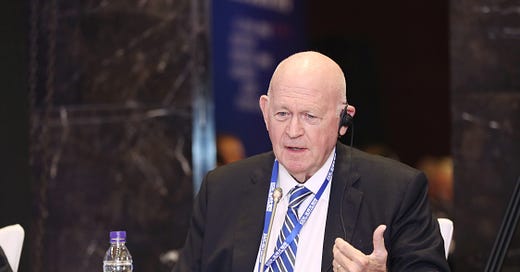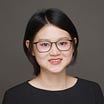Michael Pillsbury defends One China Policy in Beijing, slams Pompeo's proposal to formally recognize Taiwan
Donald Trump's "leading authority on China" lists recent U.S. provocations on Taiwan that "should not be happening" in a public CCG forum on Monday.
The following is the transcript of Michael Pillsbury's speech at the 8th China Global Think Tank Innovation Forum in Beijing on Monday, October 23, 2023. The forum is co-organized by the Center for China and Globalization (CCG) and the Chinese People's Association for Friendship with Foreign Countries (CPAFFC).
Michael Pillsbury is Senior Fellow for China Strategy at The Heritage Foundation, a conservative think tank. Former U.S. President Donald Trump said Pillsbury was “The leading authority on China” in September 2018.
[BEGINS]
One of the worst crises in US-China relations happened when Joe Nye and I were in the Pentagon, 1995, 1996. China fired missiles over or near Taiwan. Very much upset our Secretary of Defense. And slowly, this crisis was healed or completed. And it resulted in the President Clinton going to visit China. And some cooperative agreements began.
So 有一个教训 the lesson I draw from that is even when we get into a US-China crisis, there's still optimistically, there's usually a way out. Sometimes it's the role of think tanks. I have been a fan and admirer of Henry [Huiyao Wang] and Mabel [Lu Miao] coming to America so often that they know the exact differences, the debate, between the different American, let's say, top ten think tanks.
One time I saw the schedule of Henry and Mabel visiting the US, I think it was 14 think tanks in 2 days, and you and your wife you knew exactly the differences between Hudson Institute, and Heritage, and Brookings, Carnegie. It's very impressive. I don't think we have an American, maybe Joe Nye had somebody at Harvard who can do this. But think tanks have a special role to be optimistic to identify the problems, but then try to think of solutions or at least a channel for dialogue. And Henry was a channel for dialogue with President Trump on the trade talks. People as economists at CCG, and Professor Chen [Wenling] here and others had specific ideas: China will agree to this in the trade talks, and not that. And this was outside regular channels, but very helpful.
Now I only have one or two points to make today. One is I'm deviating from the role of a think tank person to be optimistic. I'm relatively pessimistic that relations between US and China and our friends on both sides, Chinese friends, American friends - the situation is getting worse 越来越恶化. It's not a time for optimism. Some of the reasons are lack of communication. No Congressional delegation came here for four years until Chuck Schumer and his bipartisan delegation. By their account, there's a lot of argument going on. The meeting with Xi Jinping was not an optimistic meeting.
There were up to 50 channels in US-China relations between government departments until President Trump cut them all off - cut them all off, his first year. So you would think President Biden would restore all the channels. How many people think Biden restored all the channels that Trump cut off? Put your hand up? Biden at first restored no channels, and now it's roughly five. And there are very thin discussions between 部长, between cabinet ministers.
Secondly, the One China principle, or the One China policy, used to be the foundation - China called it 政治基础 (political foundation) of the US-China relations. Now, recently, the PLA [People's Liberation Army], I think correctly - Joe [Nye], correctly - PLA said "America is distorting and stretching beyond belief the one China principle". Right now, this week, House and Senate are discussing a proposal, with strong bipartisan support, to put American weapons and ammunition on Taiwan, to station them there permanently, then to set up a strategy group between the American Pentagon and Taiwan's military to do joint military planning, then to continue the American special forces troops already placed on Taiwan two years ago. This should not be happening. The One China policy or principle should not be violated. The Heritage Foundation recently published a study about a new Cold War with China. We explicitly said we support continuing the One China Policy, but our fellow conservative think tank Hudson Institute Henry used to visit - now it's been sanctioned - Hudson Institute's position, they sent 我们以前的国务卿 (our former Secretary of State) Pompeo, he flew to Taipei 两次 two times, proposed diplomatic recognition of Taiwan. This never happened in the last 50 years. So I can give you a long list. There's actually quite a long list. Both sides have 红线 red lines. Each side has been crossing these red lines in the last few years. So I hope I'm wrong. I hope all think tanks who came today will be optimistic and come up with some solutions. But just to make a list, Henry, of the conflicts, 我们必须避免的冲突 (the conflicts we have to avoid) we need a good list of what are the conflicts that think tanks could be innovative about. 我讲完了,谢谢,各位。 (I'm done talking, thank you.)
[ENDS]
The live recording of Michael Pillsbury's speech
audio
video
Note: The "Joe" Pillsbury referred to was Joseph Nye, Harvard University Distinguished Service Professor, Emeritus and former Dean of Harvard's Kennedy School of Government, who also attended and spoke at the forum.












